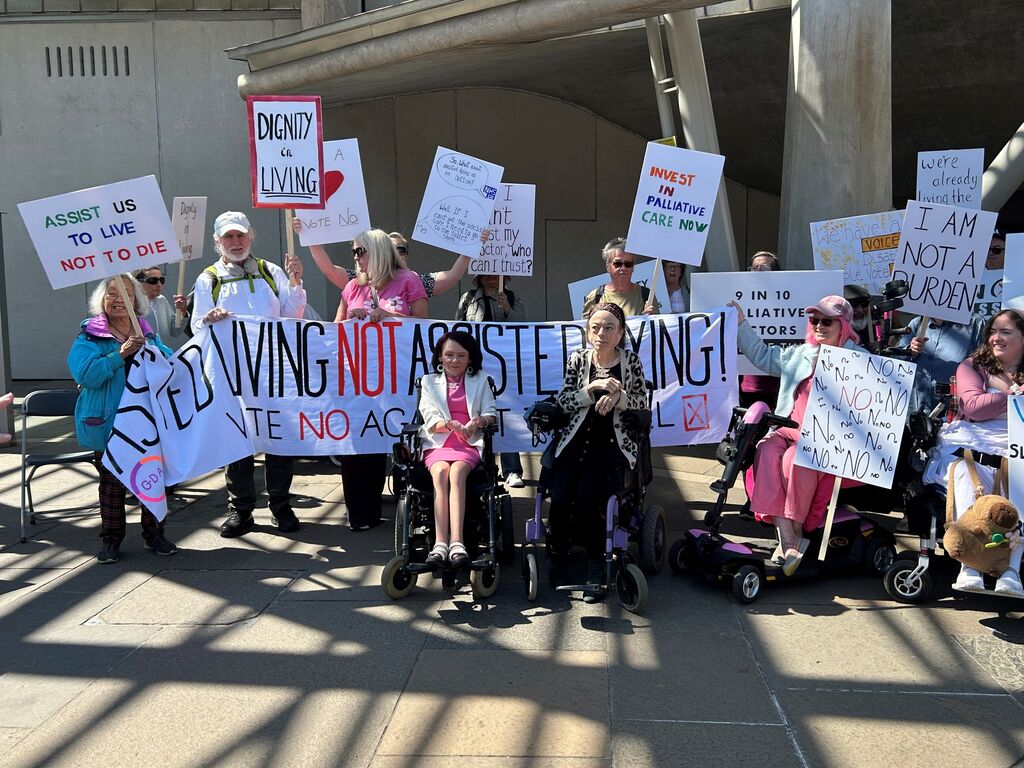Assisted Suicide
CARE for Scotland responds to 'deeply sad' assisted suicide vote

CARE for Scotland has extended solidarity to disabled Scots after MSPs voted to progress a Holyrood assisted suicide bill.
Last night, MSPs backed Liam McArthur's Assisted Dying for Terminally Ill Adults (Scotland) Bill by a margin of 70 votes to 56, with one abstention.
The Bill will now proceed to line-by-line scrutiny in a committee, before a final debate and vote by the whole parliament.
Reacting to the vote last night Stuart Weir, Head of CARE for Scotland, said:
“We’re deeply saddened by the outcome of tonight’s vote, and our thoughts are with disabled Scots and many others who will be feeling great anxiety.
“Assisted suicide would undermine suicide prevention in Scotland and send a harmful message that some lives aren’t worth living. Evidence from other countries shows that ‘safeguards’ do not work. And we know that marginalised and vulnerable members of society suffer the worst abuses. We hope that parliament will reconsider at Stage 3.
“Instead of legislating for assisted suicide, the Scottish state should be ensuring that every life is protected and focusing on improving truly life-affirming forms of care. Holistic palliative care can meet the physical, mental, relational, and spiritual needs of terminally ill Scots – but only if it receives appropriate investment and prioritisation.”
At a demonstration before the debate and vote, disabled actor Liz Carr voiced her concerns about the Scottish Bill. She said:
“I am so fed up of having to answer strangers’ questions, even in this day and age, who think that being us must be the worst thing imaginable,” she said to campaigners, which included a number of disabled people.
“That having pain, having difficulty with everyday activities, must mean that it would be better if we were dead – that is not the case.”
Speaking to Press Association, Carr said she worried that the definition of a terminal illness in the Bill was too broad and could even include people with her condition – arthrogryposis multiplex congenita.
“The definition under Liam’s Bill is so wide, it doesn’t have a time frame – that’s good and bad in some ways, it’s almost impossible to define prognosis and diagnosis in people at the end of their life unless you’re right there within days or a couple of weeks, actually,” she said
“But it also has a definition that I would qualify under, I would define myself as a disabled person, but actually the definition of having a progressive condition, I would come under that.
“So the potential for this to include far more than just those with true terminal illnesses … those as well with degenerative conditions, is what concerns so many of us and so many of the people that are here today.”
The vote came after five hours of debate, which included emotional speeches by MSPs on both sides. Opponents of a change in the law described their concerns about coercion of vulnerable people, the 'slippery slope' seen in other countries, and the risks to disabled members of society.
Liam McArthur, the sponsor of the Bill, broke down as he concluded his opening remarks in the debate, in which he cited difficult cases he has heard of involving intense suffering at the end of life. SNP MSPs Elena Whitham and George Adam also shared highly personal stories as they argued for ‘assisted dying’. Ms Whitham about her late mother, who endured a painful death, and Mr Adam about his wife who lives with a crippling medical condition.
The most powerful contribution from opponents was from Labour’s Pam Duncan-Glancy MSP, Holyrood’s only fulltime wheelchair user, who warned colleagues that “if this bill passes, there’s a risk that it will be easier to get help to die than support to live”. Noting that proponents of assisted suicide cite the idea of ‘choice’, she argued that disabled people and others grappling with inequality don’t have real choices and wouldn’t with regard to assisted death.
Ms Duncan-Glancy warned of “internalised, everyday ableism” and “systemic coercion” that can make disabled people feel like they are “better off dead”. And she pleaded with colleagues to vote down the bill because it could “serve to legitimise a view that a life like ours, one of dependence and of pain, is not worth living”. Rather than legislating for assisted death, she suggested parliament should “legislate to assist people to live”.
Other spirited contributions came from the Conservative benches. Senior Tory MSP Murdo Fraser argued that the “slippery slope is real”, noting that when ‘assisted dying’ laws are passed, there’s quickly pressure for expansion to other groups. Mr Fraser warned against “sacrificing the rights of the weak and the vulnerable” for the choice of assisted death for a few, adding that the “solemn duty” of parliamentarians is to be a “sword and shield” to such groups.
SNP politician John Mason pointed to the resource implications of assisted suicide laws, arguing that there is “scope for a fair amount of savings”, and that there may one day be an incentive for governments to save money by "encouraging premature deaths", even if not overtly.
Earlier in the debate, Scotland’s Health Secretary Neil Gray – who was the one MSP who abstained – was asked where the money would come from for an assisted dying regime, and which NHS budgets would be affected. He said the government did not currently have a view.
You can find out how your MSP on the assisted suicide bill here: How your MSP voted on the assisted dying bill - BBC News
Share
